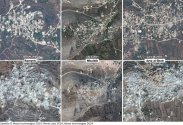Yeah , now you guys are also coming out with excuses for China's performance just like the
@kwaigonegin has been doing. You are doing the same thing you guys have been criticising him for doing. lol
Thing is China's objective was to prevent Vietnam from invading and occupying Cambodia and removing Polpots regime who was one of China's strongest allies back then. However, China failed to save polpots regime and failed to stop Vietnam from occupying Cambodia and installing a Vietnamese puppet government. Lol China had to pull out as well after severe losses and not being able to make Vietnam pull out from Cambodia or come to Cambodia's aid. So many will also argue China lossed, some will say it was even more critical for China was fighting a medium neighboring country just a step away from its land border while the US was fighting far way from its homeland in a foriegn continent far away from her territory.
As I said before, it depends on what we also define as loss. Lol
Some will argue both the US/France and China all lost in Vietnam. Others will argue they didn't really lost militarily per se but politically, others will say it was a complete loss where rhey couldn't sustain the war etc etc. All depends on the target audience and where the bias lies in I guess.

